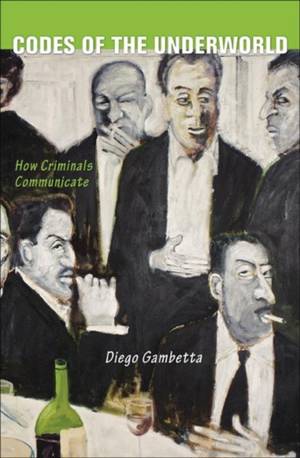
- Afhalen na 1 uur in een winkel met voorraad
- Gratis thuislevering in België vanaf € 30
- Ruim aanbod met 7 miljoen producten
- Afhalen na 1 uur in een winkel met voorraad
- Gratis thuislevering in België vanaf € 30
- Ruim aanbod met 7 miljoen producten
Zoeken
€ 51,95
+ 103 punten
Omschrijving
The signs and signals of criminal communication
How do criminals communicate with each other? Unlike the rest of us, people planning crimes can't freely advertise their goods and services, nor can they rely on formal institutions to settle disputes and certify quality. They face uniquely intense dilemmas as they grapple with the basic problems of whom to trust, how to make themselves trusted, and how to handle information without being detected by rivals or police. In this book, one of the world's leading scholars of the mafia ranges from ancient Rome to the gangs of modern Japan, from the prisons of Western countries to terrorist and pedophile rings, to explain how despite these constraints, many criminals successfully stay in business. Diego Gambetta shows that as villains balance the lure of criminal reward against the fear of dire punishment, they are inspired to unexpected feats of subtlety and ingenuity in communication. He uncovers the logic of the often bizarre ways in which inveterate and occasional criminals solve their dilemmas, such as why the tattoos and scars etched on a criminal's body function as lines on a professional résumé, why inmates resort to violence to establish their position in the prison pecking order, and why mobsters are partial to nicknames and imitate the behavior they see in mafia movies. Even deliberate self-harm and the disclosure of their crimes are strategically employed by criminals to convey important messages. By deciphering how criminals signal to each other in a lawless universe, this gruesomely entertaining and incisive book provides a quantum leap in our ability to make sense of their actions.Specificaties
Betrokkenen
- Auteur(s):
- Uitgeverij:
Inhoud
- Aantal bladzijden:
- 368
- Taal:
- Engels
Eigenschappen
- Productcode (EAN):
- 9780691152479
- Verschijningsdatum:
- 7/08/2011
- Uitvoering:
- Paperback
- Formaat:
- Trade paperback (VS)
- Afmetingen:
- 152 mm x 231 mm
- Gewicht:
- 521 g

Alleen bij Standaard Boekhandel
+ 103 punten op je klantenkaart van Standaard Boekhandel
Beoordelingen
We publiceren alleen reviews die voldoen aan de voorwaarden voor reviews. Bekijk onze voorwaarden voor reviews.











